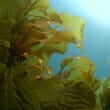Background
- Fucus vesiculosus is a brown seaweed that grows on the northern coasts of the Atlantic and Pacific oceans and the North and Baltic seas. Its name is sometimes used for Ascophyllum nodosum, which is another brown seaweed that grows alongside Fucus vesiculosus. These species are often included in kelp preparations along with other types of seaweed.
- The Vietnamese, as well as other Asian populations, consume seaweed as food in various forms: raw in a salad and as a vegetable, pickled with sauce or with vinegar, as a relish or in sweetened jellies, and also cooked for vegetable soup. As an herbal medicine, seaweed has been used for traditional cosmetics, treatments for cough, asthma, hemorrhoid, boils, goiters, stomach ailments, and urinary diseases, and for reducing the incidence of tumors, ulcers, and headaches. Vietnam has an abundance of algae floral with a total number of species estimated to be nearly 1,000 of which there are 638 species of marine algae identified.
References
Natural Standard developed the above evidence-based information based on a thorough systematic review of the available scientific articles. For comprehensive information about alternative and complementary therapies on the professional level, go to . Selected references are listed below.
- Amster E, Tiwary A, Schenker MB. Case report: potential arsenic toxicosis secondary to herbal kelp supplement. Environ Health Perspect 2007 Apr;115(4):606-8.
View Abstract - Clark CD, Bassett B, Burge MR. Effects of kelp supplementation on thyroid function in euthyroid subjects. Endocr Pract 2003;9(5):363-369.
View Abstract - Conz PA, La Greca G, Benedetti P, et al. Fucus vesiculosus: a nephrotoxic alga? Nephrol Dial Transplant 1998;13(2):526-527.
View Abstract - Durig J, Bruhn T, Zurborn KH, et al. Anticoagulant fucoidan fractions from Fucus vesiculosus induce platelet activation in vitro. Thromb Res 1997;85(6):479-491.
View Abstract - Eliason BC. Transient hyperthyroidism in a patient taking dietary supplements containing kelp. J Am Board Fam Pract 1998;11(6):478-480.
View Abstract - Ellouali M, Boisson-Vidal C, Durand P, et al. Antitumor activity of low molecular weight fucans extracted from brown seaweed Ascophyllum nodosum. Anticancer Res 1993;13(6A):2011-2020.
View Abstract - Lamela M, Anca J, Villar R, et al. Hypoglycemic activity of several seaweed extracts. J Ethnopharmacol 1989;27(1-2):35-43.
View Abstract - Le Tutour B, Benslimane F, Gouleau MP, et al. Antioxidant and pro-oxidant activities of the brown algae, Laminaria digitata, Himanthalia elongata, Fucus vesiculosus, Fucus serratus and Ascophyllum nodosum. J Applied Phycology 1998;10(2):121-129.
- Müssig K, Thamer C, Bares R, et al. Iodine-induced thyrotoxicosis after ingestion of kelp-containing tea. J Gen Intern Med 2006 Jun;21(6):C11-4.
View Abstract - Nishiyama S, Mikeda T, Okada T, et al. Transient hypothyroidism or persistent hyperthyrotropinemia in neonates born to mothers with excessive iodine intake. Thyroid 2004;14(12):1077-1083.
View Abstract - Picco G, de Dios-Romero A, Albanell N, et al. [Regular intake of seaweed and hyperthyroidism]. Med Clin (Barc) 2006 Jul 1;127(5):199
View Abstract - Pye KG, Kelsey SM, House IM, et al. Severe dyserythropoiesis and autoimmune thrombocytopenia associated with ingestion of kelp supplements. Lancet 1992;339(8808):1540.
View Abstract - Shilo S, Hirsch HJ. Iodine-induced hyperthyroidism in a patient with a normal thyroid gland. Postgrad Med J 1986;62(729):661-662.
View Abstract - Skibola CF, Curry JD, VandeVoort C, et al. Brown kelp modulates endocrine hormones in female sprague-dawley rats and in human luteinized granulosa cells. J Nutr 2005;135(2):296-300.
View Abstract - Teas J, Braverman LE, Kurzer MS, et al. Seaweed and soy: companion foods in Asian cuisine and their effects on thyroid function in American women. J Med Food 2007 Mar;10(1):90-100.
View Abstract







